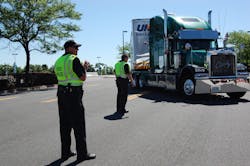Concerns continue to grow within the trucking industry that long-awaited changes to hours of service (HOS) rules going into effect today may put a significant crimp in truck capacity, which many experts believe is already extremely tight.
According to a recent survey by consulting firm Transport Capital Partners (TCP), almost 40% of the TL carriers polled expect truck utilization to drop more than 5% due to the HOS changes, with just over 38% expecting under a 5% change and only 3% expecting no impact.
On top of that, TCP added that almost 19% of the TL carriers it surveyed still haven’t determined the full impact of the HOS changes.
Richard Mikes, one of TCP’s managing partners, noted during a Stifel Nicolaus sponsored webinar back in May that the major worry is that drivers will leave the industry due to the HOS rule changes.
“We will lose drivers [due to] the new HOS regulations. That is a real issue,” he pointed out, noting that research by the American Trucking Associations forecasts a 1.5% to 4% reduction in productivity as a result of the HOS alterations.
“If you have less productivity, you have less capacity,” Mikes stressed. “When a driver has a 34-hour restart period, but he has to be in bed in the early morning both days, it is really difficult to dispatch around.”
The HOS changes promulgated by the Federal Motor Carrier Safety Administration (FMCSA) about a year and half ago don't change the 11-hour daily driving limit and 14-hour work day provisions, but instead change other critical parts of the regulations:
- Limits the maximum average work week for truck drivers to 70 hours, a decrease from the current maximum of 82 hours;
- Allows truck drivers who reach the maximum 70 hours of driving within a week to resume if they rest for 34 consecutive hours, including at least two nightly sleeping periods from 1 a.m. to 5 a.m.;
- Requires truck drivers to take a 30-minute break during the first eight hours of a shift;
- Trucking companies and passenger carriers that allow drivers to exceed driving limits by more than three hours could be fined $11,000 per offense, with drivers themselves facing civil penalties of up to $2,750 for each offense.
"It all adds up to a loss of productive work time with no discernible impact on improving highway safety," noted John Hausladen, president of the Minnesota Trucking Association, in a statement. “These new rules will impact both businesses and consumers. Customers will still receive their shipments, but it might take longer and cost a little more.”
Rosalyn “Roz” Wilson, senior business analyst with Delcan Corp. and primary author of the annual State of Logistics report – sponsored by the Council of Supply Chain Management Professionals and presented by Penske Logistics – pointed out that the trucking sector has been in “a delicate balance” for several years now in terms of capacity and those changes to HOS rules could make that problem go critical.
“Utilization rates are at all time highs with load volumes on the rise but new regulations are expected to take a bite out of industry productivity, especially the new HOS rules,” she explained during a press event last month, with the new rules representing a theoretical 17% reduction in a standard work week for truck drivers.
Wilson estimates the actual impact of the HOS changes should fall somewhere between a 2% to 10% productivity decrease and put pressure on the industry to find more drivers.
“The HOS changes could have the effect of a net 2% to 5% reduction in driver capacity, so projecting that out arrives at the need for another 100,000 drivers,” Wilson warned – and this for an industry already short 30,000 drivers by her estimates. “That is without an increase in volume.”
About the Author
Sean Kilcarr
Editor in Chief
Sean Kilcarr is a former longtime FleetOwner senior editor who wrote for the publication from 2000 to 2018. He served as editor-in-chief from 2017 to 2018.
